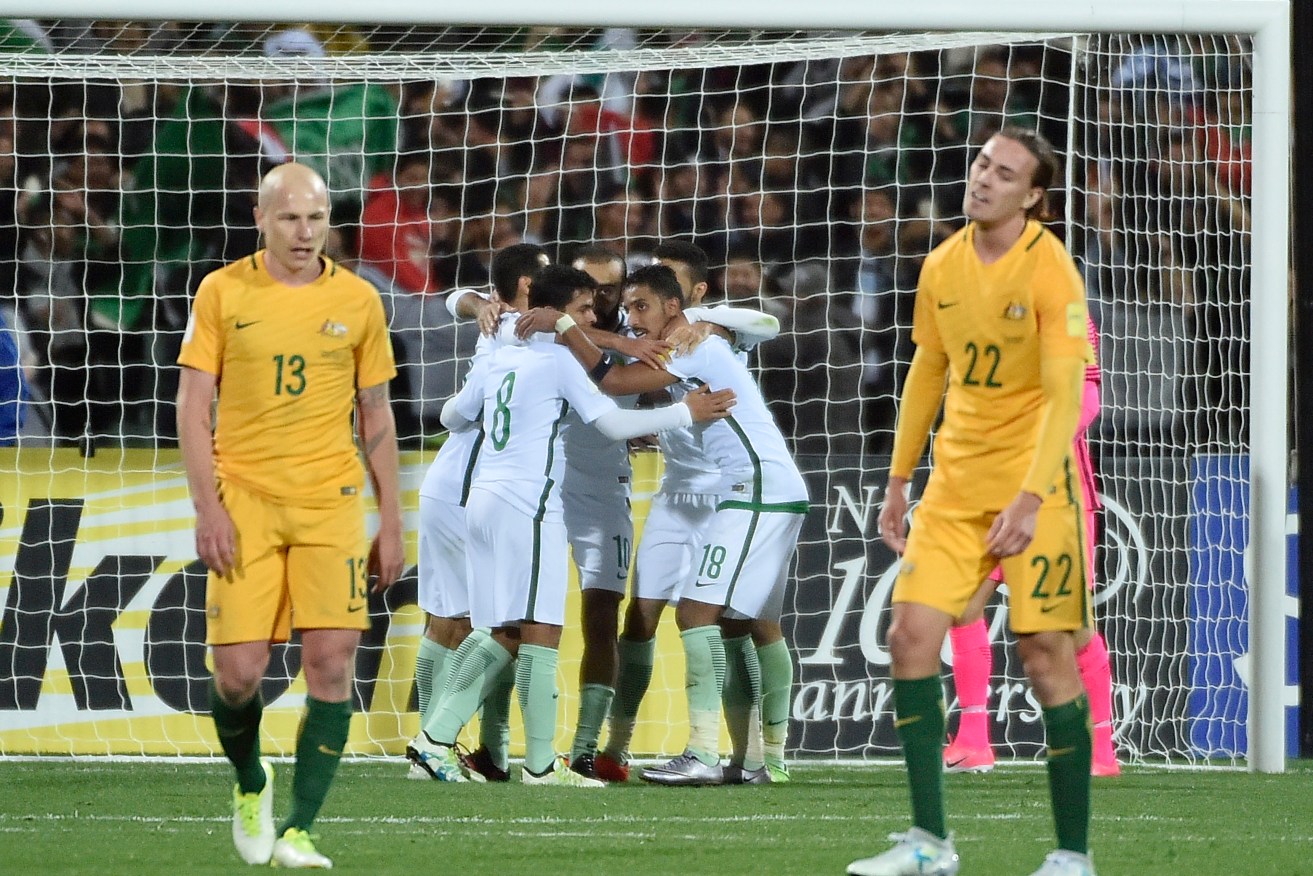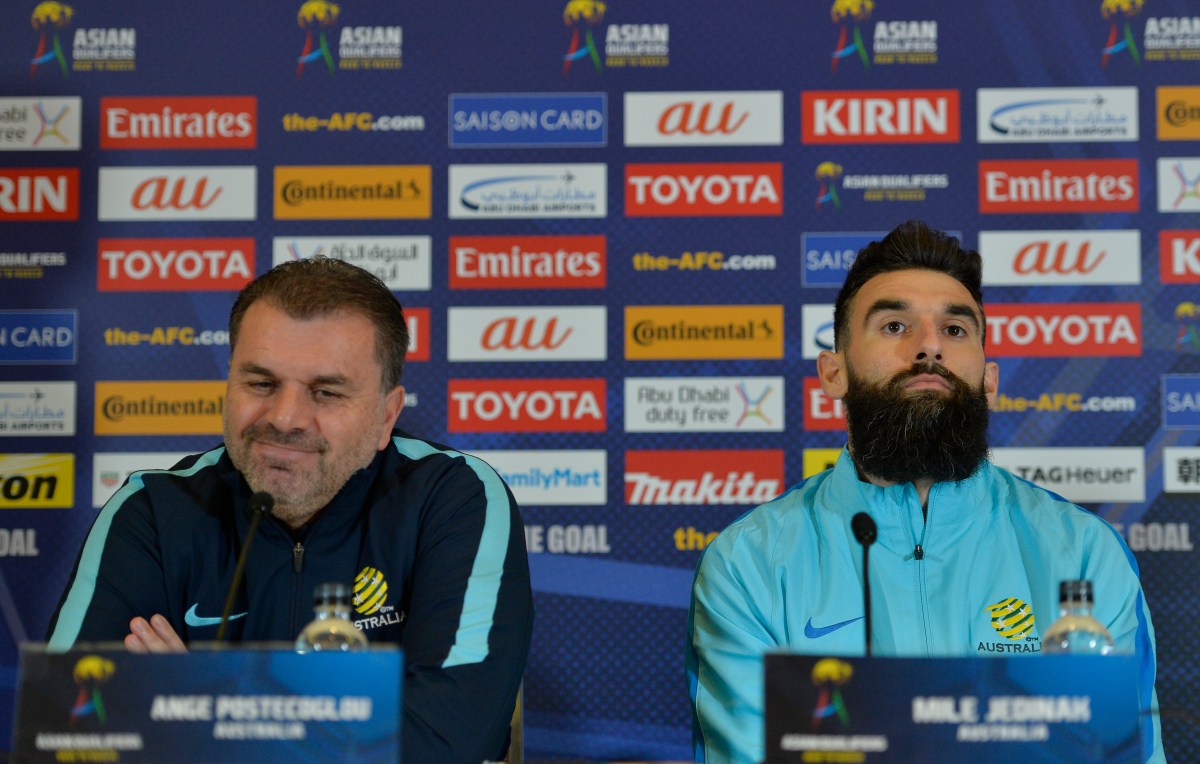Potholes in the Socceroos’ road to World Cup
Have Socceroos fans – and the team itself – forgotten how to relish the journey as well as the destination?

Saudi Arabian players celebrate after scoring during the Adelaide Oval qualifier in June. Photo: AAP/David Mariuz
The road to Russia should have been more enjoyable. It offered the Socceroos new and intriguing destinations, and an unprecedented 18-match odyssey in which the freshly crowned champions of Asia could strut their stuff.
But since it began in Bishkek two years, two months and two weeks ago, the journey has become a bit like a long drive with kids in the back continually asking if we’re there yet.
And that’s not because of results (though a run of four draws, in which Australia led in three matches, wasn’t fun) – it’s the complacency that’s been present throughout the qualification process.
Twelve years ago we were desperate to end three decades of heartbreak. Books have been written (and a film made) about the almighty effort: the roles played by the team, coaches, administrators and even fans to break the drought. Maybe now that’s officially A Long Time Ago.
Because I’ll remember the campaign for Russia 2018 as one in which the collective attitude denigrated the qualification imperative.
These were the words of Socceroos coach Ange Postecoglou before Australia played Iraq in March:
“Everything we do, every decision we make – about selection, the way we play – is designed so that if we do get to a World Cup, we can make an impact.
“Whether that happens or not, time will show all that, but in the meantime I’m not going to try to sit in a place of consolidation or try to sort of reel it back in.
“I just don’t think that serves any purpose for anyone.
“I know people feel good about qualification, I understand that – I certainly want to qualify for a World Cup.
“But just qualifying for a World Cup has proven in the past (to be) not as fulfilling as maybe people think it is when you’re in the middle of it.”
Among soccer journos in our mainstream media, there is as much diversity of opinion as a Soviet Union Communist Party congress during the Stalin era.
The Iraq match would see Australia held to a draw – after going ahead – by a team that had lost four of its five group matches to that point (and only beating bottom-placed Thailand).
Afterwards, Ange used the P word:
“You’ll get a pragmatic coach straight after me and you’ll all revel in that and then you’ll be seeking someone who does things differently.”
And that wouldn’t be the last time we’d hear it.
It’s hard to see how 30 minutes of pragmatism against Iraq, which might have secured a win and a crucial extra two points, would have ruined Postecoglou’s grand design. He’s been at the helm for nearly four years now.
And given Australia’s history of heartbreak, you’d think that a Socceroos coach whose inflexibility jeopardised qualification would be genuinely challenged about his methods. But it hasn’t happened. Among soccer journos in our mainstream media, there is as much diversity of opinion as a Soviet Union Communist Party congress during the Stalin era.
Instead we’re routinely reminded that the team isn’t that good (certainly not when you compare it with the famous squad of 2006).
What isn’t mentioned as much is that our opponents aren’t that great either. Japan has declined since its Asian Cup triumph of 2011; Saudi Arabia hasn’t fired in genuine international competition since reaching the 2007 Asian Cup final; the Iraqis have some talent but also have to deal with all kinds of logistical hurdles; and while Thailand has improved it’s been from a low base. United Arab Emirates, who will almost certainly finish fourth in this group, should have done better but were inexplicably insipid in several crunch games.
The narrative of the last two years, which has failed to reinstitute the tenet that the qualification race is itself a great competition and not just a means to an end, might also explain an evident drop in fan engagement. And the result of that will be an underwhelming finale.
What will we see when the Socceroos play Thailand next week in a match that might decide qualification on Australian soil? The packed MCG that saw the Socceroos play Iran in 1997 and Uruguay in 2001? The packed Stadium Australia that saw the decisive matches against Uruguay in 2005 and Iraq in 2013?
Nope. We’re playing at Melbourne Rectangular Stadium which holds just 30,000 people. And tickets are still available.
Tickets. Are still available.

Socceroos coach Ange Postecoglou with captain Mile Jedinak. Photo: David Mariuz / AAP
Fortunately, back on the pitch, Australia has enjoyed a Bradbury-esque run since the draw against Iraq in March. The Socceroos’ last two matches have resulted in home wins over UAE and Saudi Arabia. To make matters better, group leader Japan managed to drop points against Iraq and, overnight, UAE upset the second-placed Saudis.
And suddenly, a win in Japan tomorrow night would book the Socceroos’ place in Russia next year.
A draw wouldn’t be a bad result either as it would mean that a home win over Thailand next week would be enough.
But a loss would take Australia’s destiny out of its hands again. It’d mean that Japan would seal qualification while the Saudis would go into their last match – against Japan who’d then have nothing to play for – with a goal difference advantage over the Socceroos (only the top two teams in the group qualify; third place means sudden death playoffs).
The Saudi-Japan match will kick off after Australia-Thailand too so, if it ends up being a goal difference race, the Saudis will know exactly what they need.
Whatever happens in Japan tomorrow night, I’ll fly to Melbourne for the match against the Thais. And if the Socceroos secure a berth at the World Cup finals, I’ll enjoy the sweet taste of qualification – I haven’t forgotten what it means.
The only possible upside of missing out would be that it’d remind the complacent that it’s bloody painful.
Paul Marcuccitti is InDaily’s soccer columnist.




